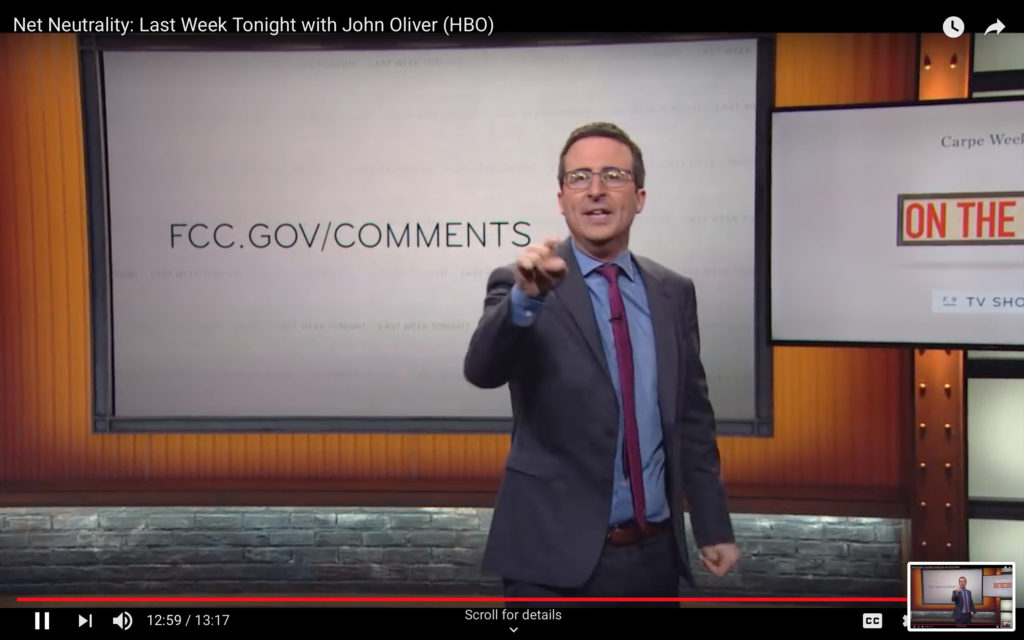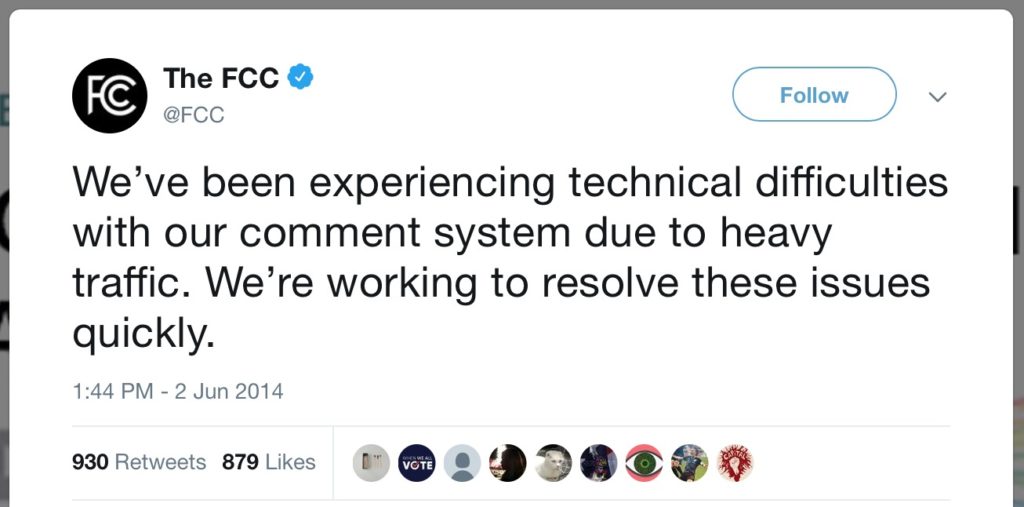From HBO to the FCC: How John Oliver Impacted the Net Neutrality Debate
Last Week Tonight with John Oliver has often been set apart from its fellow satirical current affairs programmes by its concerted efforts to engage its audience in active campaigns to effect change surrounding the issues covered on the programme. Through the show’s basic format of host Oliver discussing news stories or social problems in humorous and irreverent yet rigorously researched fashion, the show has on several occasions sought not just to inform its audience about its subject matter but to mobilise them to both spread awareness of, or actively impact the topics covered—as is saliently exemplified by the 2014 segment ‘Net Neutrality’.
As its name would suggest, the segment focused on the topic of net neutrality—that is, the principle that internet service providers treat all traffic as equal—and threats to it, specifically then-new potential regulations proposed by the Federal Communications Commission (FCC). The piece outlines the basics of this issue and ends with a call to the audience to make their objections known to the FCC on their official website. The segment lead to a widespread and highly publicised online response to the FCC, and was widely held to have significantly impacted the debate surrounding net neutrality and even influenced legislative decisions. Analysing this object, its dissemination, and the response to it can thus provide a useful case study in the uses of media to create a social and political impact.
The segment first aired on HBO on Last Week Tonight’s official YouTube channel on the same day. At that time, the FCC was considering new regulation that would effectively end net neutrality by allowing cable companies to implement a “two-tier system” where access to higher internet speeds (or the “fast lane”) would incur charges for companies providing online content, such as Amazon and Netflix. Oliver outlines the potentially disastrous effects of these developments—chiefly a system that favours established companies which can already afford the charges, leading to monopoly—and also highlights the unethical conduct and wide-reaching influence of cable companies such as Comcast and Time Warner (President Obama’s hiring of cable lobbyist Tom Wheeler as chair of the FCC is cited as especially egregious). Throughout, Oliver supplements the facts and figures with flippant levity of a kind likely to appeal to a layperson or casual viewer—he jokes about how dull a topic net neutrality seems, and argues that ‘Preventing Cable Company F*ckery’ would be a better description. At the segment’s conclusion, Oliver reveals that the FCC are taking public comments on their website for 120 days and then addresses “the internet commenters out there”. He gives a speech direct to camera playing on the popular trope of the bilious internet commenter, urging his online audience to turn their penchant for virulent harassment toward the FCC and make their displeasure at the potential end of net neutrality known. Oliver’s direct style of address and knowing references to internet culture speak to his audience on their terms, framing participation in the commenting campaign not as an order to be obeyed, rather as a natural extension of their cultural identity—‘process of cultivation’ of the audience that ‘(presumes) individual liberty’ on their part (to use Anna McCarthy’s terminology) seeks to guide them to action in such a way that they feel as though it is an autonomous decision rather than an outside imposition.

The segment quickly entered the cultural zeitgeist—the official YouTube posting received 800,000 views within two days—and its initial impact was almost immediately apparent. Within a day of the segment’s debut, the FCC took to Twitter to report that their website had crashed ‘due to heavy traffic’—and whilst they did not confirm this to be the case, it was widely believed that this was caused by the Last Week Tonight feature due to the timing and the presence of numerous comments on the FCC website explicitly referring to it. The segment thus achieved an immediate and public impact on its subject, making tangible to the FCC (and elected representatives) the scope of support for net neutrality, through outlining the issue in accessible fashion then giving its audience a quick and easy way to take action. In the week following the episode’s airing, an increase in Google searches for ‘net neutrality’ compared to the weeks immediately before and after was recorded, suggesting a correlation between the segment and interest in the subject, and thus that it increased engagement with the topic.


If we move beyond the short term, however, a more profound impact is visible. In March 2015, the FCC revealed its new internet regulations, which specifically addressed several of the problems Oliver raised: the ‘fast and slow lanes’ system was scrapped, and speed lowering and content blocking prohibited—and many were quick to attribute this to the impact of the segment. Time called the new regulations an example of ‘the John Oliver effect’ (referring to Last Week Tonight’s tendency to prompt increased attention and action surrounding the issues it covers) while prominent net neutrality advocate Dr Aram Sinnreich tweeted his thanks to Oliver. The segment’s immediate impact thus built into long-term change: the initial object sparked the commenting campaign, an attention-grabbing stunt which centred on net neutrality and so fostered a better understanding of and concern with it in the wider culture—thus putting pressure on the FCC and so forcing them to change tack. “Net Neutrality” then, illustrates how media can have a political impact at the highest level through using the influence of a popular platform to not only publicise an issue but effectively control the dominant narrative around it, thus exerting pressure on the powerful.
There are of course limits to the extent to which media can exert real change—a fact Oliver himself would concede when he was forced to revisit the issue in another segment three years later, in light of President Donald Trump’s stated intentions to repeal the FCC’s prior ruling. The impact achieved by a piece of media is not always guaranteed and permanent, and there are few ways a media object can protect the longevity of its intended impact. Overall, however, the “Net Neutrality” episode is a success story for the political utility of media, an object which engaged its audience and mobilised them into direct, public action which created a heightened awareness and controlled the narrative surrounding its subject matter, which was ultimately able to bring about legislative change through pressure. It is thus a pertinent example for those interested in media as a tool for change, whether as scholars or practitioners.
FILMOGRAPHY:
“Net Neutrality” from Last Week Tonight with John Oliver (USA, 2014 -) Series One Episode Five https://www.youtube.com/watch?v=fpbOEoRrHyU&t=639s Accessed 10/11/2018
BIBLIOGRAPHY:
“Television Culture After World War II” in The Citizen Machine: Governing by Television in 1950s America (New York; The New Press, 2014), by Anna McCarthy, pp.1-28
Henry Bruiner, “Net Neutrality’s Stunning Reversal of Fortune: Is It John Oliver’s Doing?”, Christian Science Monitor, (USA, 2015) https://www.csmonitor.com/USA/Society/2015/0226/Net-neutrality-s-stunning-reversal-of-fortune-Is-it-John-Oliver-s-doing accessed 12/11/2018
Amanda Holpuch, “John Oliver’s Cheeky Net Neutrality Plea Crashes FCC Website”, The Guardian (UK, 2014) https://www.theguardian.com/technology/2014/jun/03/john-oliver-fcc-website-net-neutrality Accessed 12/11/2018
Victor Luckerson, “How The ‘John Oliver Effect’ Is Having A Real Life Impact”, Time (USA, 2015) http://time.com/3674807/john-oliver-net-neutrality-civil-forfeiture-miss-america/ Accessed 12/11/2018
Rebecca R. Ruiz, “F.C.C Sets Net Neutrality Rules”, The New York Times, (USA, 2015) https://www.nytimes.com/2015/03/13/technology/fcc-releases-net-neutrality-rules.html Accessed 12/11/2018
Alex T. Williams and Martin Shelton, “What Drove Spike in Comments on Net Neutrality? Likely, A Comedian”, Pew Research Centre http://www.pewresearch.org/fact-tank/2014/09/05/what-drove-spike-in-public-comments-on-net-neutrality-likely-a-comedian/ Accessed 13/11/2018
